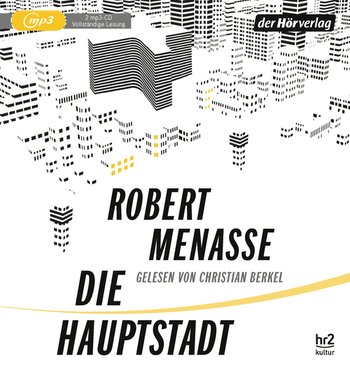€ 23,70 [A]* | CHF 31,50 * (* empf. VK-Preis)
Wo die Fäden zusammenlaufen
Fenia Xenopoulou, Beamtin in der Generaldirektion Kultur in Brüssel, steht vor einer schwierigen Aufgabe. Sie soll das Image der EU-Kommission aufpolieren. Aber wie? Sie beauftragt den Referenten Martin Susman, eine Idee zu entwickeln. Die Idee nimmt Gestalt an – die Gestalt eines Gespensts aus der Geschichte; David de Vriend dämmert in einem Altenheim seinem Tod entgegen. Als Kind ist er von einem Deportationszug gesprungen, der seine Eltern in den Tod führte. Nun soll er bezeugen, was er im Begriff ist zu vergessen. Auch Kommissar Brunfaut steht vor einer schwierigen Aufgabe. Er muss aus politischen Gründen einen Mordfall auf sich beruhen lassen; und Alois Erhart, Emeritus der Volkswirtschaft, soll in einem Thinktank der Kommission Worte sprechen, die seine letzten sein könnten. Und was macht Brüssel? Es sucht einen Namen – für ein Schwein, das durch die Straßen läuft.
Gelesen von Christian Berkel.
(2 mp3-CDs, Laufzeit: 14h 21)
Rezensionen
Wir stellen nicht sicher, dass Rezensent*innen, welche unsere Produkte auf dieser Website bewerten, unsere Produkte auch tatsächlich gekauft/gelesen haben.
Alle anzeigenVita
Robert Menasse
Robert Menasse, 1954 in Wien geboren, studierte Germanistik, Philosophie und Politikwissenschaft und promovierte über den »Typus des Außenseiters im Literaturbetrieb«. Danach lehrte er bis 1988 an der Universität São Paulo/Brasilien, zunächst als Lektor für österreichische Literatur, später dann als Gastdozent für Literaturtheorie. Einem breiten Publikum wurde er v. a. durch seinen Roman »Die Vertreibung aus der Hölle« (2001) bekannt, für den er den Hölderlin-Preis und den Breitbach-Preis erhielt. Seit 2006 befasst sich der Autor auch in Essays und Vorträgen verstärkt mit EU- und globalisierungskritischen Themen. Inzwischen lebt Robert Menasse als freier Autor hauptsächlich in Wien.
Christian Berkel
Christian Berkel, geboren 1957 in West-Berlin, studierte an der Deutschen Film- und Fernsehakademie. Der vielfach ausgezeichnete Schauspieler stand auf den bedeutendsten deutschen Theaterbühnen und ist bekannt aus zahlreichen nationalen wie internationalen Film- und Fernsehproduktionen, etwa »Der Untergang«, »Der Mann mit dem Fagott«, »Das Experiment«, »Operation Walküre« oder Quentin Tarantinos für acht Oscars nominiertem Blockbuster »Inglourious Basterds«. Außerdem spielte er die Titelrolle in der ZDF-Krimireihe »Der Kriminalist«. Berkel spricht mit in zahlreichen Hörspielen, wie »Die Rückkehr des Tanzlehrers« von Henning Mankell, und las u. a. in der preisgekrönten »Ulysses«-Lesung (Regie: Ralph Schäfer), »Cash« von Richard Price und »Schleichendes Gift« von Val McDermid, »Totenfrau« von Bernhard Aichner und J.K. Rowlings »Ein plötzlicher Todesfall«.






